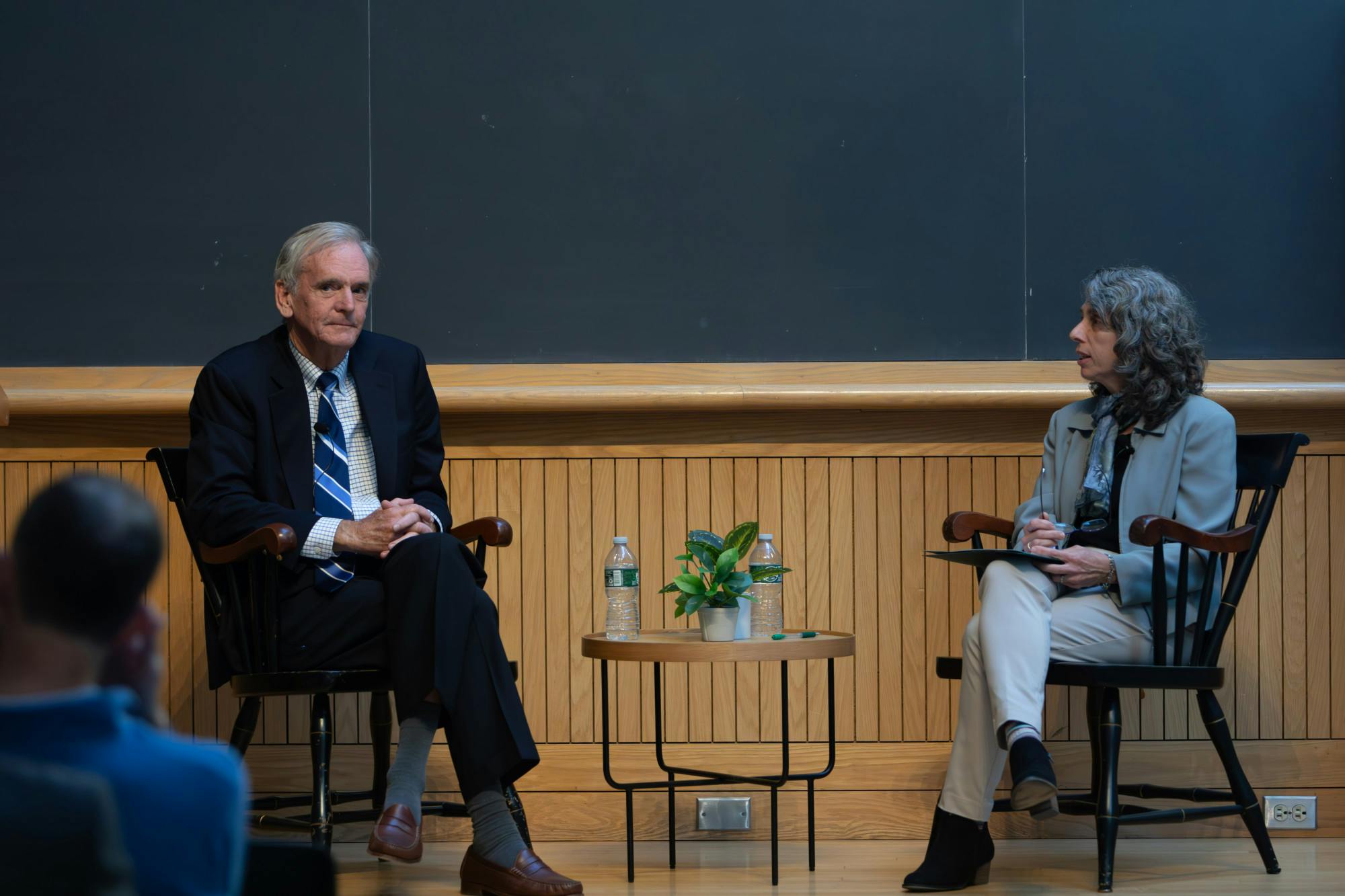On Sept. 28, the Rockefeller Center for Public Policy hosted former New Hampshire Sen. Judd Gregg for an event titled “Is the Senate Broken?”
Approximately 57 people attended the event in the Hinman Forum of the Rockefeller Center and an additional 35 people streamed the event virtually on Zoom, according to Rockefeller Center program officer Joanne Blais. Gregg, who served as New Hampshire Governor from 1989 to 1993 and was the last Republican to represent New Hampshire in the United States Senate, delivered the Rockefeller Center’s 2023 Perkins Bass Distinguished Lecture. The Rockefeller Center named Gregg its 2023 Perkins Bass Distinguished Visitor last month.
Gregg’s lecture topic was informed by his “view of how [the] government and particularly Congress is functioning and not functioning well,” according to assistant director at the Rockefeller Center Robert Coates. Named after former New Hampshire representative Perkins Bass ’34, the lecture series invites individuals who have contributed distinguished service to the state of New Hampshire to speak at Dartmouth.
“You’ve got a very experienced United States senator who has a view of how government and particularly Congress is functioning and not functioning well, ” Coates said.
The event began with Gregg reflecting on whether the Senate functions properly, based on his decades of experience in government service and 18 years as a senator. Gregg noted the significance of political compromise, the facilitation of conversation, and the hopeful power of leadership.
“The title of this discussion was, ‘Is the Senate Broken?’,” Gregg said. “The better question would be ‘Is American governance broken at the federal level?’ And the answer is complex.”
Gregg said one of the most significant challenges he faced in his political career was partisanship. While Gregg explained how two of his favorite presidents in United States history, George Washington and Abraham Lincoln, both served at times when partisanship was naturally present, political brinkmanship has grown significantly stronger in the modern day, he added. Gregg characterized the two major political parties, including the Republican Party, as “almost cults.”
“There was a desire to reach agreement,” Gregg said. “That doesn’t mean there wasn't partisanship. Partisanship has always been a huge element of American politics. And the fact of course, over the years [there] has been really confrontational partisanship.”
Gregg said he blamed gerrymandering — the process by which district boundaries are manipulated to favor a specific party — as a cause of heightened partisanship. Gregg explained that officials from gerrymandered districts only have to earn the support of their ideological base, preventing compromise and bipartisanship.
“In other words, you run the primary, you win in that district,” Gregg said. “That part of your party, they don’t tolerate compromise. They have very strong views. They want you to carry those views to Washington.”
Gregg also spoke about the power social media has to increase political polarization, which he said has “created a disproportionate megaphone for the fringe elements within our political dialogue.” Though Gregg praised social media for facilitating more conversations, he explained that it has also drowned out rational discussions of complex issues and enabled polarizing perspectives.
After Gregg’s lecture, the event transitioned into a Q&A between Gregg and the audience, moderated by government professor Kristin Smith. Several of the audience questions asked about possible solutions to polarization in the United States.
“I think the only way you can address it is through leaders,” Gregg answered. “Having leaders who will take on the complex issues and are willing to stand up to the vitriolic domination, the hateful domination, on social media.”
Chelsea Barrett ’27, who said she attended the event because of her interest in politics and her experience as a Senate page, noted “all the terrible things that are happening and the issues with partisanship.” However, she said Gregg’s hopeful closing message, that “this too shall pass,” resonated with her.
“[Despite] this problem that this country’s had with partisanship and other issues, [I look forward to] getting the chance to make new changes and [see] new leaders coming,” Barrett said.
Kelsey Wang is a reporter and editor for The Dartmouth from the greater Seattle area, majoring in history and government. Outside of The D, she likes to crochet, do jigsaw puzzles and paint.




